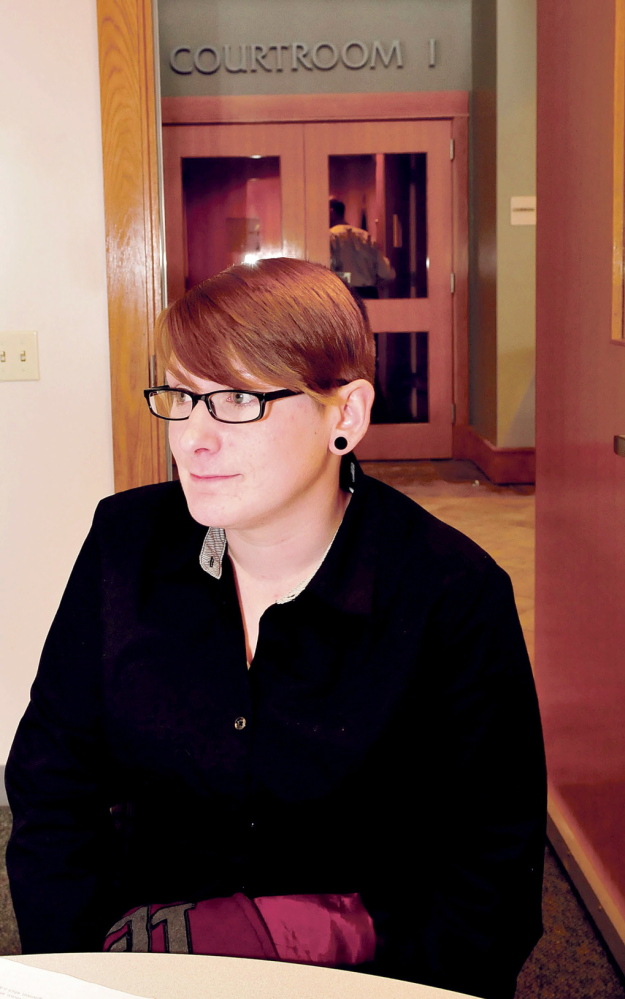SKOWHEGAN — It took Abby Fowler nearly half a lifetime to plead guilty to heroin possession.
Fowler, 25, addicted to opiates and alcohol since she was 12, stood before a judge Wednesday as the first participant in Maine in the Alternative Substance Abuse Program.
The charge against her is a felony; but under the new program developed by Kennebec and Somerset Counties District Attorney Maeghan Maloney, the Somerset County Sheriff’s Department and other state agencies, Fowler can withdraw the guilty plea in one year in exchange for a conviction on a lesser misdemeanor charge and will do no jail time.
All the mother of two young children has to do is comply with the provisions of the program that Maloney calls “ASAP.”
If she fails the program, Fowler will be sentenced on the felony charge to four years in prison, with all but one year suspended, and two years’ probation.
If she succeeds, her record will be free of a felony conviction.
“It’s been a year in the making,” Maloney said of the program. “We’ve come together to try to find a solution to the drug problem we have in Somerset County. This is the first time we have established a program like this and she is our first participant.”
something clicked
Fowler, who grew up in Norridgewock and now lives in Skowhegan, said the day of her arrest in October was the first day of her recovery.
“I’m so grateful that it happened, I really am; because if it didn’t, I’d still be in that vicious cycle. It was finally my out,” she said. “That’s when it started to click. It’s definitely hard, but I’m learning that if it’s not hard, it’s not worth it.”
Fowler dropped out of high school when she was a freshman, then went to an alternative school in Portland and dropped out again. She already had been drinking alcohol and consuming opiates for a few years by then.
“Addiction was all around me. My dad was an addict and an alcoholic,” she said. “I was an addict all along, but it’s all interpretation whether I was recreationally using or I had an every-day addiction.”
She said Oct. 9 was the last day she used drugs or alcohol.
She chose to enter the ASAP program when she realized how out of control her life had become. She said there was no personal accountability until she met Sgt. Teresa Brown at the Somerset County Jail and started going to meetings for substance abuse.
âgive people a chance’
Maloney said Fowler has no criminal history as an adult and has been drug-free since October, making her an ideal candidate for the new program. Fowler’s name was suggested to Maloney by people at the sheriff’s department and the jail, including Brown, who worked with Fowler on her road to getting clean and sober, Maloney said.
Fowler also agreed to run Narcotics Anonymous meetings in Madison while out on bail awaiting trial on the drug charge.
“She seemed like someone who made a mistake and is trying to correct it,” Maloney said.
Dale Lancaster, chief deputy at the sheriff’s department, is a member of the group that established the program, along with health and human services advocates, family violence and behavioral health workers.
“We have usually 70 or 80 people from Somerset County in our jail on any given day, and I think we need to offer them something so we can reduce recidivism,” Lancaster said. “It’s a cost savings to the county and it helps the communities if we are able to help someone, give them a hand up.”
Fowler’s attorney, John Alsop, said the ASAP program has been needed for years.
“It’s long overdue here. Abby is a good candidate for that. She’s tried hard to deal with her addiction and she’s getting some support,” Alsop said. “The idea of locking people up for this hasn’t been very helpful. You can lock up the dealers and people that are bringing it in, but give these people a chance to clean up.
“I think she knew when she hit bottom and decided to pull herself out of it. I give her a lot of credit for doing this and the jail people — Teresa Brown up at the jail really went to bat for her — have been terrific,” Alsop said. “She wanted to get this done and did a good job.”
A win-win
Maloney said Fowler could have pleaded guilty to the felony drug charge and been sentenced to 90 days in jail.
“Under normal circumstances, that would have been the end of the story,” Maloney said. “Instead, she entered this program; and instead of 90 days in jail, she will spend one year in mental health and substance abuse treatment. Instead of losing her job, she gets to keep it. Instead of being away from her two children, ages 3 and 5, she’s able to continue to see them.”
Maloney said the community is safer if Fowler and others like her get treatment, as opposed to being locked up, then coming out having lost everything. Maloney said she first tried to establish a drug court in Skowhegan, as seen elsewhere in Maine, but the lack of available judges prevented that.
Maloney said the philosophy of the ASAP program is the same as the philosophy of the veterans and co-occurring disorders courts recently established in Kennebec County.
“The philosophy is if you give someone a chance but have a large hammer hanging over the person’s head if they don’t comply, that they’re actually more likely to be successful,” Maloney said. “She really does want to be successful. She doesn’t want to have heroin to be a part of her life anymore, and we believe she’ll be successful at that.”
Under the terms of the program agreement, Fowler must comply with the following provisions:
⢠mental health counseling and substance abuse treatment, to include weekly meetings at Kennebec Behavioral Health for the duration of the program;
⢠following the recommendations of her mental health counselor and the program coordinator at the sheriff’s office;
⢠engaging in weekly community service, full-time work or school;
⢠refraining from use or possession of alcohol or illegal drugs;
⢠agreement to random search and testing for drugs and alcohol; and
⢠attendance at monthly meetings with the ASAP team.
Fowler said she has learned that recovery is more than just taking the drugs away.
She said she had to fix what’s inside of her — the behavior, the thought process, the compulsion and the obsession. Spending time in jail doesn’t stop the causes of drug and alcohol abuse; it just takes them away for a couple of months, she said.
She said the move has brought her and her family closer together.
“I distanced myself from them,” she said. “I didn’t see what was really going on. All along they would have been there for me if I had just reached out.”
Doug Harlow — 612-2367 dharlow@centralmaine.com Twitter: @Doug_Harlow
Send questions/comments to the editors.





Success. Please wait for the page to reload. If the page does not reload within 5 seconds, please refresh the page.
Enter your email and password to access comments.
Hi, to comment on stories you must . This profile is in addition to your subscription and website login.
Already have a commenting profile? .
Invalid username/password.
Please check your email to confirm and complete your registration.
Only subscribers are eligible to post comments. Please subscribe or login first for digital access. Here’s why.
Use the form below to reset your password. When you've submitted your account email, we will send an email with a reset code.